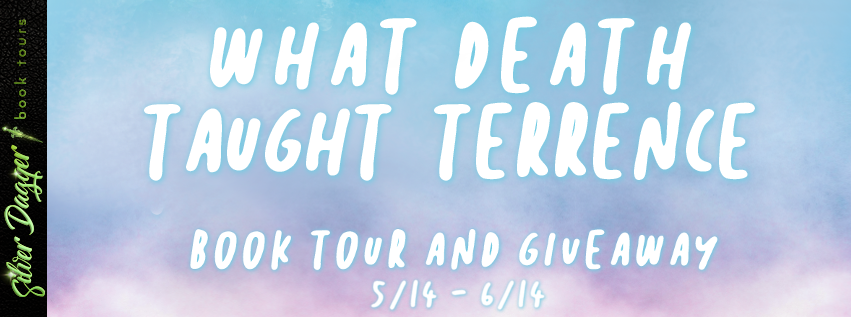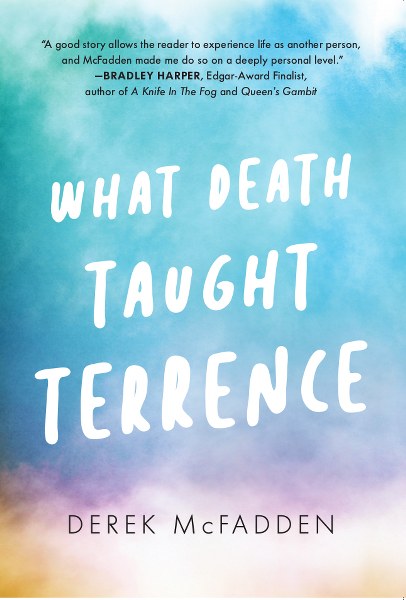What Death Taught Terrence
by Derek McFadden
Genre: Inspirational Fantasy
LIFE IS A JOURNEY. SO IS THE AFTERLIFE.
At the end of his life, Terrence McDonald must discover its meaning,
or he’ll be banned from the afterlife forever, and his soul will cease to
exist.
Join Terrence–
and those who love him–on a poignant and
unforgettable journey through a life at once wonderful and harrowing.
Learn what Terrence learns. See what Terrence sees. By this provocative
story’s end, readers may even learn a thing or two about themselves.
***
The TV is on, and I’m on the couch, leaning as far back as I can. My heavy, indecisive brown eyes—their
lenses blurred ever since my tumultuous, too-soon entrance into the world—flutter between open and
shut. I am half-watching half-listening to a football game on a Sunday afternoon. Was that the doorbell?
“Who is it?” I call out, expecting to hear my daughter, Megan’s, voice. These days, she is the one person
who visits me. The only person who knows I’m making my home in this little oasis fashioned from wood
felled by my own hand.
“Terry, it’s Mom. I’m here to help you move.”
My mom? That’s not possible. She’s...
Wait. To help me move? Oh, God.
I rise from the couch and glance back at my lifeless body.
PRAISE FOR What Death Taught Terrence
“What Death Taught Terrence offers a powerful, painful, and poignant look at the life of a man rarely
encountered in fiction. Derek McFadden’s writes with an insight few can match.”
— T.F. ALLEN, author of The Night Janitor and The Keeper
“A good story allows the reader to experience life as another person, and McFadden made me do so on
a deeply personal level. If you like the works of Mitch Albom, I think you’ll find What Death Taught
Terrence a worthy addition to your library and the reading of it a lifeaffirming journey.”
— BRADLEY HARPER, Edgar-Award Finalist, author of A Knife In The Fog and Queen’s Gambit
“In What Death Taught Terrence, Derek McFadden builds a world that satisfies both our desire for
imagination and our need for personal introspection. I found this (story) immediately immersive, and it
stuck
with me long after I finished. McFadden is doing something rare in today’s fiction—exploring the limits of
what we will believe to form a better understanding of who we are.”
— ALEX DOLAN, author of The Euthanist and The Empress of Tempera
Derek McFadden is the author of the novel What Death Taught Terrence, available in February of 2020
wherever fine books are shelved. Other works of note include the well-regarded Prose From A Grandson
To A Senior Fellow.
Born with a mild case of cerebral palsy, his is "a voice for those whose voices have yet to be heard,"
according to the online publication Audacity Magazine.
GUEST POST
How did you become an author?
The writing bug bit me early. Growing
up in a house where my father also wrote stories, it was not a long
jump to my own tales. Though I did not become a writer because he
was a writer, Dad’s support was invaluable.
What is something unique about you?
I was born with a mild case of cerebral
palsy, a brain injury which occurs at–or just after–birth. For
years, I learned as much as I could about palsy, while I also fought
against the idea that this was my unique trait. I’m a
writer, I told myself. That’s unique enough, right? People
don’t need to know about my palsy. This, I discovered, kept me
clear of confrontation or tough questions, but it hurt my soul not to
be talking about my palsy and my unique life experience. Beyond that,
it has been my experience that the handicapped are misrepresented in
literature. They’re either too saintly–telling the able-bodied
how to live while suffering–or too broken to matter. In writing
What Death Taught Terrence, I hoped to share something both unique to
me and universal. All of us have issues, even if they aren’t quite
as visible as a halting walk, a foot perpetually turned too far
right.
What are some of your pet peeves?
I read books all day with/for a
literary agent, and I love it! But some of my pet peeves do involve
this work.
-When an author is so convinced
their book is beyond wonderful that they won’t listen to
constructive criticism. There’s no faster way to turn an agent or
their readers/assistants off.
-Writing that is too exposition-y. Tell
us as much as you can in dialogue. This was the way Hemingway wrote.
He let the characters and their circumstances tell the story. BUT if
your dialogues reads as false, so will your story. For example:
“There’s Joe,” Jane said. “It’s
so good to see him. It’s been over a year since he had his heart
attack last 4th of July. I hear he’s lost some weight,
too.” No one talks like this, literally ever. Do not make
readers suffer through this. It is much easier to put down a book
than it ever was to write it. If you’ve convinced a reader to crack
open your book-baby, don’t give them any reason to shun it.
-Not using the “personal address”
comma
Commas are important. In fact, they
could save lives.
One basic writing-rule that some
authors need help remembering or putting into practice at all is that
of the “personal address” comma.
Example:
Correctly written.
In a conversation with your friend Tom,
the correct way to greet him would be:
“Hello, Tom.”
Notice the comma.
The incorrect way to greet good ole Tom
would be:
“Hi Tom.”
Notice the decided lack of a comma.
I can hear you out there, yelling at
your computer, asking, “What does it matter if I put in the comma
or if I leave it out? It’s a grounded apostrophe, that’s all!”
Didn’t I tell you earlier it could
save lives, that comma? Here’s how.
You’re inviting your grandmother to
dinner.
“Let’s eat, Grandma,” you say.
How nice of you to extend such a well-meaning invitation.
And now, without the comma:
“Let’s eat Grandma.”
You’re a cannibal, plain and simple.
Use the comma. It. Saves. Lives.
Who is your hero and why?
This question has a simple answer, but
every time I get into it, I’m struck by “the feels” all over
again. My grandfather, Richard Dale Kenbok, was a fine, upstanding
man. A soldier in the Korean war. A railroad switchman for forty
years, he worked two jobs–the other as a short-order cook–to
support our family. The thing is, while my dad and my uncle quite
accurately called him Dad, theirs was not a biological bond. Their
bond with him–and mine and my brother’s connections with him,
too–came from the love he showed for us all, and his extraordinary
effort to treat us all as his own.
We were his kids and grand-kids, and we
wouldn’t have it any other way.
For all he did for us, Papa Dick, as we
call him, is my hero, even a decade and a half after his passing.
Follow the tour HERE for special content and a giveaway!








No comments:
Post a Comment